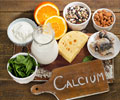A new research is doubtful about the value of supplements and calcium-fortified foods that builds stronger bones
If you feel that your child is getting too little calcium, think twice as a new research is doubtful about the value of supplements and calcium-fortified foods that builds stronger bones.
"The review shows that supplementing the diet with calcium in healthy children has little benefit for bone health," said lead author Tania Winzenberg. As a result, calcium supplementation should not be pursued as a public health policy for healthy children, the review concludes."Such foods may have a role in children with medical conditions affecting their bones or their ability to absorb calcium, or in children with very low dietary calcium intake; for example in children who do not consume any dairy products at all," she said.
Winzenberg’s team gathered results from 19 studies that added extra calcium to the diets of girls and boys ranging in age from 3 to 18. The calcium boost was delivered in different ways including tablets and by extracting minerals from milk and then adding it to food.
"We found there wasn’t much effect at all," said Winzenberg, a family physician and epidemiologist who studies muscle and bone development at the Menzies Research Institute, Australia. "It does challenge what we thought we knew."
Pediatricians and parents are concerned with calcium intake because they want to ensure that boys and girls achieve peak bone strength in childhood, a time when kids build bone at an accelerated pace.
The link between calcium intake in childhood and osteoporosis risk in adulthood is not clear. But the idea is that the more bone mass a child starts with the more she will end up with later in life, even with the inevitable bone loss that comes with old age.
Advertisement
In fruits and vegetables and dairy products the calcium is incorporated in the protein. If one absorbs the calcium with the protein, they will absorb most of the calcium.
Advertisement
Source: Newswise











